|
|
| |
|
 Musings from the Edge of Forever
Musings from the Edge of Forever
Note: This blog expresses only the opinions of the blog owner,
and does not represent the opinion of any organization or blog
that is associated with RONIN ON EMPTY.
|
|
Archive for September, 2010
Thursday, September 30th, 2010
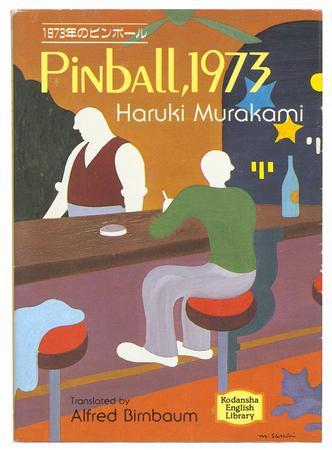
When I started reading Haruki Murakami’s work, the going rate on eBay for Kodansha’s English translation of Pinball 1973 was well over $250 a copy. I couldn’t and still can’t afford to pay that much for a novel (and wouldn’t if I could), and until recently, the only version I had of Alfred Birnbaum’s translation was one that had been transcribed onto a Microsoft Word document. I figured until a US/UK publisher got the rights, I’d be stuck with my digital copy. Well, never fear — it looks like the English translation of Pinball 1973 finally came back into print in Japan because I just bought it for $15 from an eBay seller.
In any event, both Pinball 1973 and its predecessor, Hear the Wind Sing, provide interesting, if entirely non-compulsory backstory to the events of Murakami’s more internationally known work, Wild Sheep Chase — in fact, the three books form what Murakami calls, “The Trilogy of the Rat.” J’s Bar, the novel’s unnamed narrator, his business partner, and the aforementioned Rat all get introduced in these two early works. Both of these slender tomes provide an interesting primer to all things Murakami: references abound to author fetishes like elephants, ears, spaghetti, suicide by hanging in a forest, an old girlfriend named Naoko, and wells — the deep, dark bottomless kind. (more…)
Posted in Japanese Literature, Haruki Murakami | No Comments »
Wednesday, September 29th, 2010
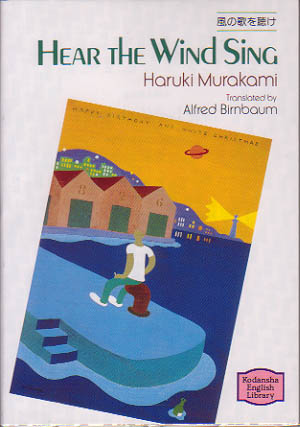
“You keep looking at the sea and you start to miss being with people; you stay around people all the time and you just want to look at the sea. Funny about that.”
For reasons that aren’t entirely clear to me, I decided to start reading Haruki Murakami again. As a warm-up, I read Jay Rubin’s Haruki Murakami and the Music of Words before plunging once again into Murakami’s first novel, Hear the Wind Sing. I did something like this before with my previous blog when I heard that a film adaptation of Norwegian Wood was in the works, and now that Tran Anh Hung’s version has been filmed, perhaps that’s part of the impetus to reacquaint myself with the work of one of my favorite authors. My last attempt at a Murakami marathon didn’t get quite as far as I planned (I had, quite ambitiously, thought I would read all of Murakami’s books in the order they were published in Japan and then write about them), but I think I might give it another go.
Published as Kaze no Uta o Kike in 1979, Hear the Wind Sing wasn’t translated until 1987 by Alfred Birnbaum. And funnily enough, the English translations for this novel and his second book, Pinball 1973 — have never been made available by any American publisher. They are only published in Japan as part of the Kodansha English Library. To my knowledge, Murakami has never provided an actual answer as to why these works have not been published in the West, but each novel’s length as well as its narrative content may factor into the decision. However, thanks to ebay and Amazon, these books are not completely out of reach.
According to the author, the idea for the book originated when Murakami was watching a baseball game. He became possessed with the idea that he must write a novel, and so, while running the bar Peter Cat for his father-in-law, Murakami would write for an hour every night for the next three months. After submitting the finished manuscript to a literary magazine, he won the Gunzo Literary Prize right off the bat. Not a bad start, eh?
(more…)
Posted in Japanese Literature, Haruki Murakami | No Comments »
Monday, September 27th, 2010
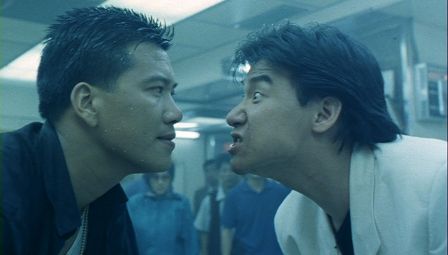
Round 1, Fight! Alex Man vs. Jacky Cheung in As Tears Go By
[Periodically, Ronin on Empty will be taking a look back at some Hong Kong cinema classics, albeit with a specific emphasis on “Great Moments” — i.e. classic scenes that no Hong Kong cinema fan (old or new) should miss. Of course, “classic” will not only entail super-cool, gobsmacking moments, but also the downright ridiculous stuff, too. The numbers — #1, #2, etc. — are not indicators of ranking, but merely a way to keep a running tally of how many “great moments” we can list here. Readers are welcome to send in their own fave scenes as well.]
From Ronin on Empty reader “Jason” comes a personal film pick that he wants to add to my ongoing “Great Moments in Hong Kong Cinema” column. Jason writes:
The confrontation between Tony (Alex Man) and Fly (Jacky Cheung) at the end of Wong Kar Wai’s “As Tears Goes By” deserves to be the next greatest moment. The movie also marked the directorial debut of one of the greatest HK director, and the rare collaboration of two of the biggest “teen wong” of HK.
Ask, and ye shall receive.
(more…)
Posted in Great Moments in Hong Kong Cinema, As Tears Go By, Maggie Cheung, Jacky Cheung, Andy Lau, Wong Kar-Wai | 2 Comments »
Friday, September 24th, 2010
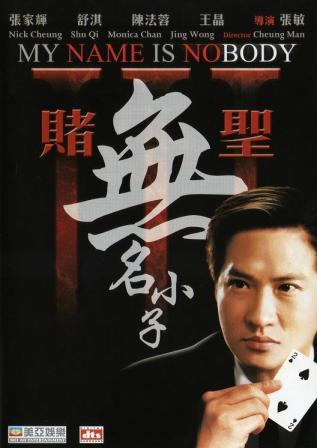
Nick Cheung is Nobody. Um, why?
In 2000, Aman Cheung Man directed My Name is Nobody, a surprisingly dark gambling film starring Nick Cheung and Shu Qi. Some viewers might have wondered, why is Nick Cheung’s character named “Nobody”? Is this a reference to the occasionally nameless swordsmen who populate Chinese wuxia books, movies, and comics? I’m guessing it is, at least partially. But the true origin for the name of this Wong Jing-produced film will take us on an odyssey of sorts, leading us from Hong Kong to the Italian West to the Greek Island of Ithaca.
(more…)
Posted in Odyssey, Homer, Nick Cheung, My Name is Nobody | No Comments »
Thursday, September 23rd, 2010
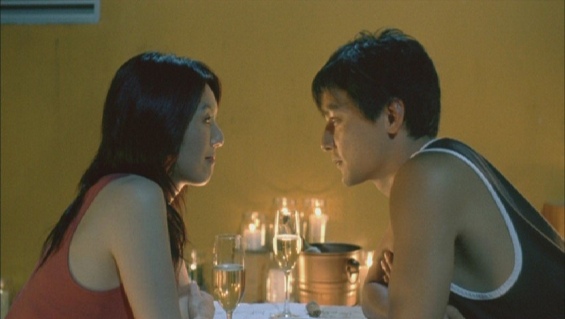
Miriam Yeung and Daniel Wu in Drink-Drank-Drunk
If you have yet to see Derek Yee’s Drink-Drank-Drunk (2005), you might be surprised to learn that it isn’t really a film about the joys of alcoholism, despite what its title, premise, and pre-release advertising might have led you to believe. Instead, this romantic comedy centers on a beer hostess — Siu-Min (Miriam Yeung) who may be able to hold her liquor, but is getting a little long in the tooth for her job. Soon, she meets Michel (Daniel Wu), a globe-trotting chef specializing in French cuisine whose restaurant just isn’t connecting with the locals. While drinking his sorrows away, Michel ends up sleeping it off at Siu-Man’s apartment. After the impromptu sleepover, the two become fast friends and — not surprisingly — faster lovers.
(more…)
Posted in Drink-Drank-Drunk, Derek Yee, Daniel Wu, Miriam Yeung, Hong Kong cinema | 1 Comment »
Wednesday, September 22nd, 2010
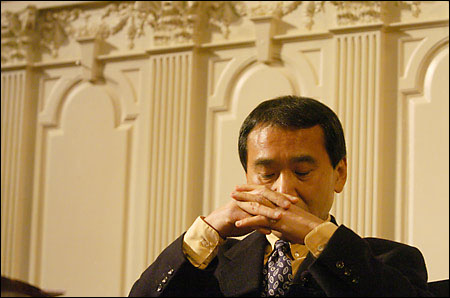
The vast majority of my favorite authors share one distinguishing quality — they’re all dead. So unless the Umbrella Corporation unleashes a T-Virus on the graves of some of my literary idols, I don’t think I’ll ever have the chance to get Mark Twain’s autograph in person or pick Raymond Chandler’s brain (literally, if we’re sticking to this Resident Evil scenario) about his most famous creation, Philip Marlowe. It’s simply a fact I’ve come to accept.
However, there is one living author whom I would very much like to meet — Haruki Murakami. But seeing as how he lives in Japan and I don’t, the chances of running into the guy seemed somewhere between slim and none.
In April of 2007, Mr. Murakami made an appearance at the University of Hawai’i at Manoa to kick off the annual Celebrate Reading: Book Clubs and Literature Festival. Unfortunately, I had already graduated from the University of Hawai’i and was in the midst of my first year at UC-Santa Cruz when he gave his talk. I was bummed out about it, but luckily, he showed up at UC-Berkeley to give another talk and accept the Berkeley Japan Prize. This time around, I got to attend his lecture. Murakami was an amusing, quirky, and engaging speaker, but unfortunately, I never got to ask him a question or get his autograph. Maybe next time.
(more…)
Posted in Haruki Murakami | No Comments »
Tuesday, September 21st, 2010
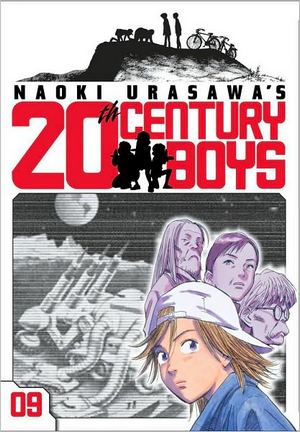
I like Naoki Urusawa’s 20th Century Boys a lot, but I’ll be the first to admit that the initially easy task of having to explain the plot is getting exceedingly ridiculous with each succeeding volume. To give you a sense of the level of difficulty I’m talking about, let me try to summarize (without spoilers) — as clearly as possible — the events that form the basis of the plot for Volumes 9 and 10 of Viz’s snazzy English translation.
(more…)
Posted in Naoki Urasawa, 20th Century Boys, Manga | No Comments »
|
|
|
| |
| |
|
|
|
|
|
|
|
|
|
|
|
|
|
|
|
|
|
|
|
|
|
|
|
|
|
|
|
|
|
|
|
|
|
|
|
|
|
|
|
|
|
|
|
|
|
|
|
|
|
|
|
| LoveHKFilm.com
Copyright © 2002-2025 Ross Chen |
|
|








